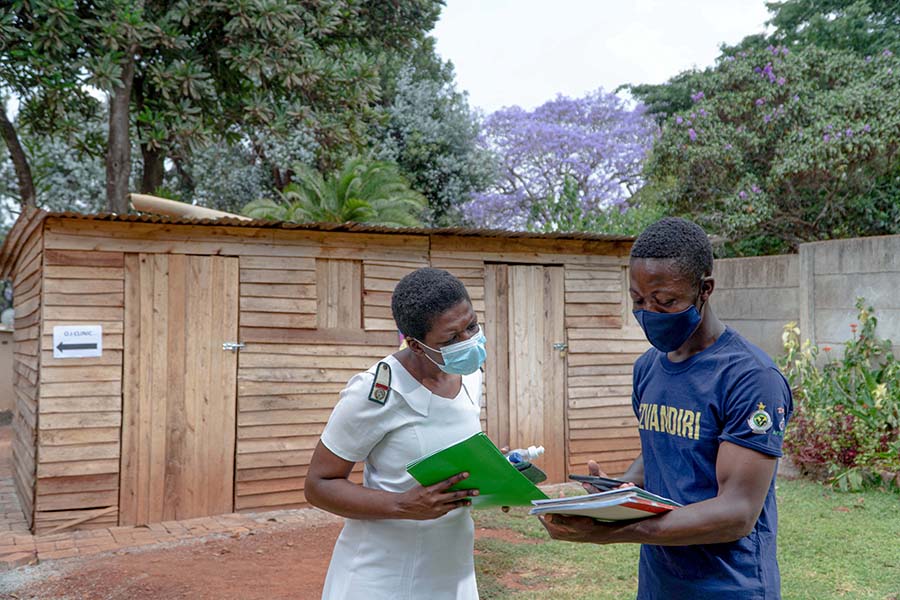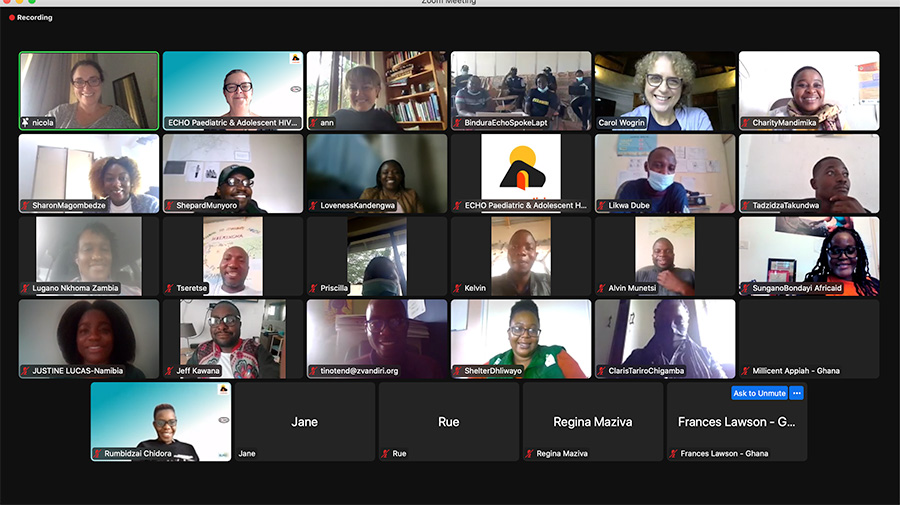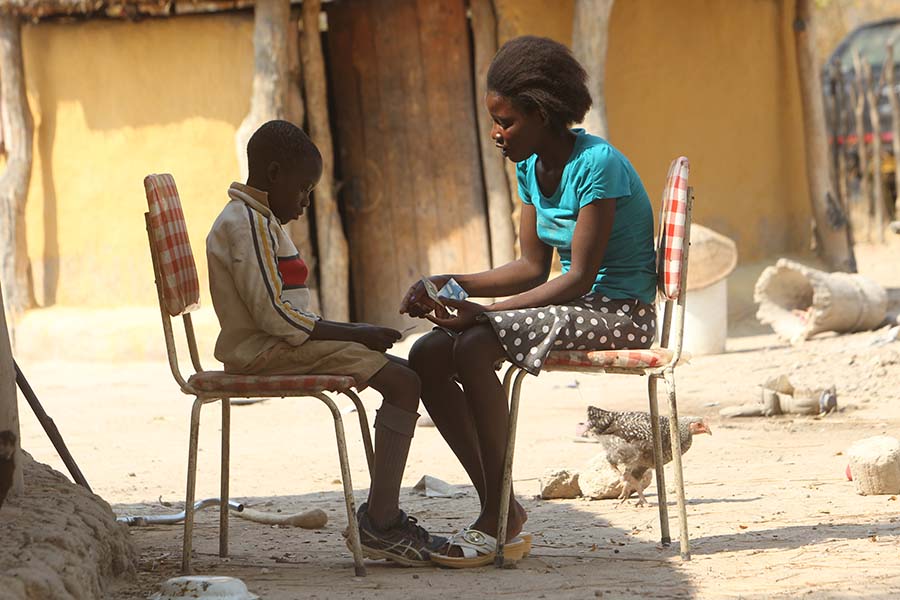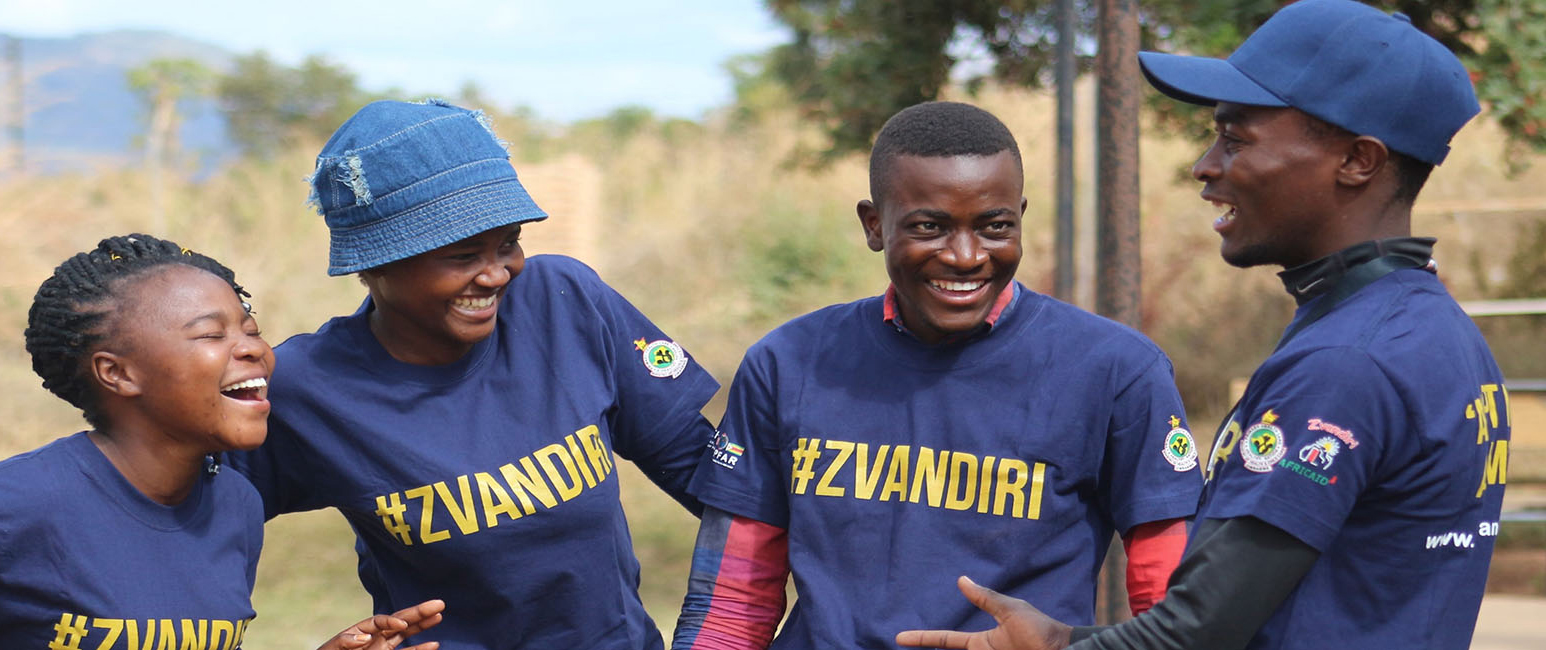“We use ECHO’s case management process to review cases together and solve difficult problems,” says Peggy Kuchocha. “Every month we talk about challenging situations, including issues of mental health, and often we have to talk about cases involving sexual and other physical violence.”

A Community Adolescent Treatment Supporter reviews planned activities with a nurse, collaborating to support HIV-positive youth with treatment, mental health services, and referrals—part of a peer-led model strengthened by Project ECHO.
Kuchocha is a nurse and project coordinator for Young Mentor Mothers (YMM) — a peer-mentorship program to support HIV-positive young mothers in Zimbabwe. The program helps young mothers get treatment as early as possible, with the goal of reducing HIV viral load, so they can give birth and breastfeed without passing the infection to their babies.
The YMM program is one of several peer-to-peer programs managed by Zvandiri, a nonprofit organization working to connect young people with peer counsellors—Community Adolescent Treatment Supporters (CATS), YMMS, and a newly-introduced cadre of Young Men Facilitators—who support their peers’ access to HIV testing, antiretroviral therapy, adherence monitoring, while also making referrals for mental health and social protection services. Zvandiri credits its success in reaching this vulnerable population to Zvandiri peer counsellors, who are young and living with HIV themselves.
Founded in Zimbabwe in 2004, Zvandiri now operates across Africa in Angola, Eswatini, Ghana, Mozambique, Namibia, Nigeria, Rwanda, South Africa, South Sudan, Tanzania, Uganda and Zambia. They hope to reach more than one million young people living with HIV in 20 countries by 2030.
In 2020, Zvandiri began partnering with Project ECHO, a global virtual mentoring organization dedicated to disseminating knowledge and best practices in rural and underserved areas, as a way to continue their training and mentorship, as well as to scale-up services while navigating COVID-19 lockdowns.

Participants join a Zvandiri ECHO virtual training session, where peer counsellors, mentors and health professionals connect across Africa to share knowledge, discuss complex cases and strengthen HIV care for young people.
“The peer counsellors are trained to identify at-risk children and youth; get them testing and treatment for HIV, and also look for signs of sexual abuse or mental health red flags,” says Ackim Nkomo, Zvandiri regional coordinator and CATS supervisor.
“They also know [how to identify] signs of malnutrition in children, and when they see one of these things, they know where, and how, to get these young people help,” he adds.
Zvandiri mentors supervise the peer counsellors and take on the more complex and challenging cases, which they present in bi-weekly ECHO case management sessions. The mentors, their supervisors, and relevant ministry of health clinical staff and district social services officers come together during ECHO sessions to make recommendations and connect clients with social services and HIV care.
Founded on case-based learning, the ECHO Model is a virtual community for participants to share support, guidance, and feedback; participants learn from one another, as well as from subject-matter experts, and knowledge is tested and refined through a local lens.
“Mental health, substance abuse and physical abuse issues are common topics on our ECHO calls,” said Nkomo. “Sometimes, children who have HIV in Zimbabwe face physical abuse and neglect; children who test positive may be neglected in favor of a sibling who has not.”
In one particularly challenging case, a peer supporter was working with a 15-year-old girl living with HIV. However, after hearing about her mother’s risky sexual behavior, the peer supporter knew that the family needed additional support.
“Because of the training that our young peer supporters had received, they recognized some red flags in this case,” said Nkomo. They screened and identified the girl’s mother as schizophrenic. Through the ECHO case management process, they engaged the government mental health department and other partners to identify next steps.

A Community Adolescent Treatment Supporter meets with a young client at home, offering personalized peer support as part of Zvandiri’s approach to improving HIV care and mental health for children and adolescents.
“In the end, the young girl was able to achieve viral suppression for her HIV; we were able to connect her with a foster family [that provided a safer living environment], and the mother received treatment for her condition,” said Nkomo.
By sharing the case in an ECHO session, the peer supporter also raised awareness of serious mental health issues within their network and to their government partners.
Many key organizations in Africa, including the World Health Organization, US President’s Emergency Plan for AIDS Relief, UNICEF, the Joint United Nations Programme on HIV/AIDS, and the Southern African Development Community, have endorsed Zvandiri’s model as a way to address the continent’s AIDS epidemic for children, adolescents and young people.
Explore how Project ECHO and Zvandiri are empowering youth across Africa to transform HIV care through peer mentorship—and learn how the Echo Model is changing lives.
Featured image description: Zvandiri peer counsellors share a moment of laughter during training.


